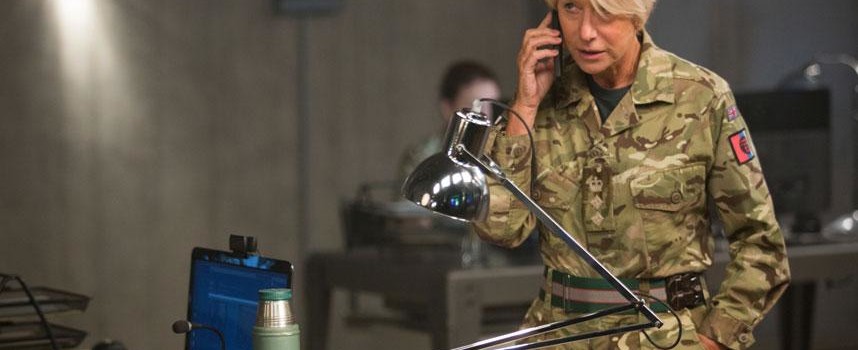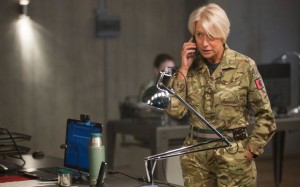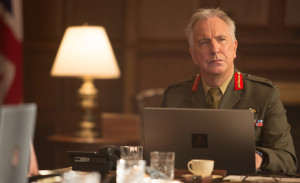Eye in the Sky lands on screens this Friday, March 11, and is about as timely a film as they come. Helen Mirren leads an all-star cast in a movie that explores the ramifications of drone warfare from all possible angles — humanitarian, legal, international relations-wise to culturally and morally.
Mirren participated in a recent press day to discuss the film and started by saluting the film’s director, Gavin Hood, for making her role truly modern as a member of the British military brass who is charged with tracking down and taking out one of the world’s most notorious and lethal terrorists.
“This originally being written for a man, and I so applaud Gavin, for casting me. Obviously, that was great for me, but for any woman,” Mirren said. “I love how it takes it out of just being a boy’s movie about war, and it makes it much more universal — that we are all a part of this conversation. I wish more directors had that point of view.”
While diving into the research element of crafting her character, Mirren was astounded at how far the technology of warfare has come. “You sort of read in the newspaper, ‘Oh, there was a drone attack on blah, blah.’ You sort of go, ‘Oh, darn it.’ I’ve never really thought about it, and it made me really consider the reality of this stuff on the ground — the extraordinary way in which warfare has changed,” Mirren said.
“You think of the 19th century idea of warfare, of people riding into battle on horses with sabers, and then World War I came along with the idea of trenches and guns. Then there was the Second World War idea of airplanes and bombs, and now we’re in the sort of third war, where warfare is continuing on, and I suspect it will be very much a part of the future.”
The legendary actress had a first-hand account of what it was like to be at the receiving end of bombs from above and what it might be like to be under attack by a drone. “I do remember my parents, who went through The Blitz in London, said the most terrifying thing about being bombed was not actually the German airplanes coming over, it was what the Germans had invented this thing called the doodlebug — which is just a very early form of drone warfare, which was an unmanned vehicle that came over and made this drone sound,” she reported.
“[My mother] said the terror was when you heard the sound stop, because when it stopped was when it dropped its bombs, and so, my mother, in a way, had sort of firsthand experience of what these people (in the film) experience. It must be so terrifying, because it’s coming out of nowhere; you don’t know that it’s coming.”
In Eye in the Sky, things get complicated when this terrorist that the world has been searching for has been located. Mirren’s British military leader is working with the U.S. Air Force who is commanding the drone and working hand-in-hand in the operation. When a local girl arrives on the scene and sets up a table to sell bread outside of where the terrorist and his cronies are, things get complicated on numerous fronts. The price of a single life versus the welfare of hundreds is just one of the topics discussed over the course of the film that is ripe with suspense, emotion and terse power.
“The film happens in real time. The two hours that you watch it in is the two hours in which the film happens,” Mirren said.
It was a unique filming experience for the veteran actress in that much of who she was talking with were in other parts of the world on screen, and therefore created a potential speed bump to tight and suspenseful prose delivery.
“I’ve never shot a movie like this. It’s very complex because this director had to keep in his mind all his cuts — the rhythm of how people would be talking in this room — [and] how it was going to interact with this, it was extraordinarily complex.”
One of the biggest draws for making Eye in the Sky for Mirren was its complexity and how it simultaneously manages to be quite original for a film format that is as old as cinema itself. “I thought this film was a great war film, because so many war films are basically good guys and bad guys. Of course we do have bad guys in it, but it’s about the terrible moral decisions that any war throws up — so I hope it will go into the canon of great war movies,” Mirren said.
“There were a couple of other projects that were flying around at the time. I said to my agent, ‘That’s the movie I want to do. If there are any conflicts I’m telling you, that’s the movie I want to do.’”
Eye in the Sky also serves as the final film that will ever star the great Alan Rickman.
“Alan would have been incredibly proud that this was his last movie, because what I love about it is that the Alan you see up on the screen is much closer to the real Alan Rickman that we all knew and loved,” Mirren said.
“You see his intelligence. You see his wit, and you see his authority. That was very much the Alan that we knew. The other characters that he played so brilliantly in the Harry Potter series, the baddie in Die Hard, and those sorts of things — he was a wonderful actor, He always gave an incredible performance. But, I think the Alan that we see on the screen in this movie is very close to the real Alan — the inner soul of the film.”



